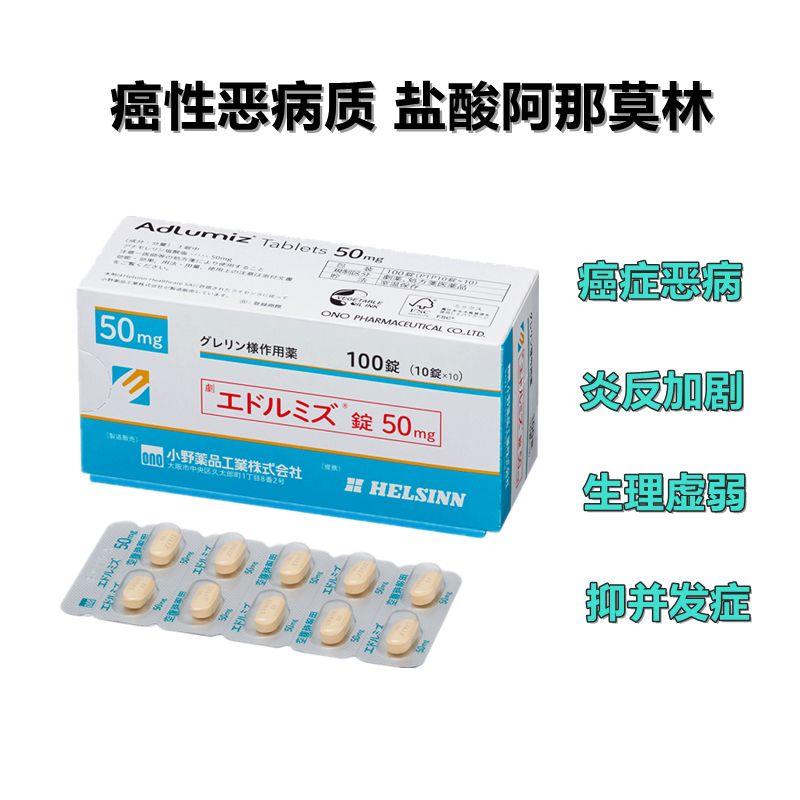Cancer – a word that strikes fear into everyone’s heart. Beyond threatening life itself, it brings countless terrifying complications.
Among them, the one that leaves patients and their families feeling most helpless is cancer cachexia:
✔ Loss of appetite
✔ Rapid weight loss
✔ Muscle wasting
✔ Extreme fatigue – even walking becomes exhausting
This condition not only undermines treatment effectiveness, but can also accelerate disease progression, leaving patients to waste away day by day in their hospital beds.
? Fortunately, Japan has developed a new drug – Anamorelin Hydrochloride (Anamorelin).
Its arrival brings new hope to those suffering from cancer cachexia.

“Anamorelin 50mg: Early Intervention for Cancer Cachexia and Inflammation”
1. What is Anamorelin Hydrochloride?
Anamorelin Hydrochloride, also known as Adlumiz (エドルミズ錠), is an innovative oral drug developed by Ono Pharmaceutical in Japan.
It mimics ghrelin, the natural hunger hormone in the human body, by activating ghrelin receptors to:
✅ Stimulate appetite
✅ Promote food intake and absorption
✅ Improve nutritional status
✅ Increase muscle mass
Since its launch in Japan in April 2021, it has become an important treatment option for cancer cachexia in patients with non-small cell lung cancer, gastric cancer, pancreatic cancer, and colorectal cancer.
2. How does it work?
Ghrelin is a vital hormone in our body that regulates appetite, energy metabolism, and promotes growth.
Anamorelin works by mimicking ghrelin, sending a “I’m hungry” signal to the brain, increasing patients’ appetite, and regulating fat and protein metabolism to help patients:
✔ Eat
✔ Digest and absorb
✔ Convert nutrients into muscle and energy
This is what sets it apart from ordinary appetite stimulants.
3. Clinical Applications & Usage
? Indications
Mainly used for cancer cachexia in patients with non-small cell lung cancer, gastric cancer, pancreatic cancer, and colorectal cancer, especially:
Patients with advanced, unresectable cancer
Those with poor response to nutritional therapy
Patients who have lost over 5% body weight within 6 months, accompanied by loss of appetite, fatigue, and decreased muscle strength
? Dosage and Administration
Adults: 100mg orally once daily on an empty stomach
Do not eat within 1 hour after taking the medication
If no improvement in weight or appetite is seen within 3 weeks, consider discontinuation
Currently, the longest usage experience is 12 weeks
4. Safety and Precautions
✅ Use with Caution in:
Patients with heart disease (valvular disease, cardiomyopathy), history of myocardial infarction or angina
Those with arrhythmias, QT prolongation, or electrolyte abnormalities
Patients with impaired liver function, especially those on CYP3A4 inhibitors
Diabetic patients (may cause increased blood sugar levels)
❌ Monitoring Requirements During Use:
Regular checks are necessary for:
ECG, pulse, blood pressure, electrolytes
Blood glucose and urine sugar
Liver function tests
If significant abnormalities are detected, the medication should be discontinued immediately.
? Special Populations
Elderly: Use with caution and close monitoring
Pregnant or breastfeeding women: Only use if the benefits outweigh the risks
Children: Safety has not been established
5. Clinical Trial Results
Phase II and III trials conducted in Japan (ONO-7643-03, 04, 05) showed:
Efficacy: Significantly improved appetite and body weight
Safety: Adverse events occurred in approximately 44.9% of patients, mainly elevated liver enzymes and increased blood sugar. Serious adverse events were rare, and the risk is considered manageable.
6. Its Significance
Cancer cachexia has long lacked effective treatments, leaving countless patients “wanting to eat but unable to, wanting to live but lacking strength.”
Anamorelin stimulates appetite, improves nutritional status, helps patients regain physical strength, enhances quality of life, and supports smoother cancer treatment.
Although it has certain side effects, when used appropriately under medical supervision, its benefits far outweigh its risks.
Conclusion
Cancer cachexia is not just about “not being able to eat.”
It determines whether patients can continue treatment smoothly, and ultimately, it affects life expectancy.
Hopefully in the future, this “little pill that helps patients eat” will be available in more countries, bringing hope and strength to many more patients worldwide.
